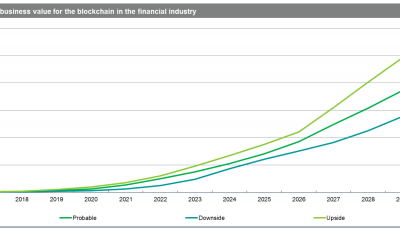A Perfect Circle
 Start-ups promising to strike it rich by capitalizing on the assuredly impending rise of bitcoin have attracted investors of all walks. Venture capitalists who have been, as an industry, hyped by decades of exponential returns on tech firms, outsiders just trying to get in on the next “unicorn“, and contrarians who see the blockchain space as a way to cut the government out of the currency loop. Circle was one such start-up, amassing somewhere in the ballpark of $130 million, an astounding amount of pledged capital for an unproven business model. The early belief was that Circle would become a valuable provider of exchange between currencies and bitcoin, bringing in fees associated with currency exchange in this new and growing space. With the recent decision to pivot away from bitcoin, what was the expressed purpose of Circle when it was formed, questions should be asked about what investors are expecting from their decisions to fund bitcoin ventures.
Start-ups promising to strike it rich by capitalizing on the assuredly impending rise of bitcoin have attracted investors of all walks. Venture capitalists who have been, as an industry, hyped by decades of exponential returns on tech firms, outsiders just trying to get in on the next “unicorn“, and contrarians who see the blockchain space as a way to cut the government out of the currency loop. Circle was one such start-up, amassing somewhere in the ballpark of $130 million, an astounding amount of pledged capital for an unproven business model. The early belief was that Circle would become a valuable provider of exchange between currencies and bitcoin, bringing in fees associated with currency exchange in this new and growing space. With the recent decision to pivot away from bitcoin, what was the expressed purpose of Circle when it was formed, questions should be asked about what investors are expecting from their decisions to fund bitcoin ventures.
From the start, the business model for firms stating their desire to cash in on blockchain technology has been fuzzy. Enabling trading and exchanging normal currencies for digital assets has a straight-forward commission- or fee-based profit model. The scalability of the technology determines the return for the investor; collecting 5% fees on $1000 or $1,000,000 is a predictable model. Mostly unregulated companies have participated in this line of business, valuing the opaqueness of bitcoin order books. Larger firms with significant backing, like Circle, Coinbase, Bitpay, and the Winkelvoss ETF, have tried to work with regulators to become fully compliant and legitimate businesses, a move that could mainstream the nascent bitcoin movement. A continuing challenge to the mainstreaming of bitcoin, and all the profits that will come along with it, has been the use case for bitcoin.
Where bitcoin has had success is in the internet-based economy of pseudo-anonymous and location agnostic transactions. Enabling gambling for anyone with an internet connection is certainly valuable, though certainly of dubious legal and ethical status. Bitcoin has also found it impossible to shake the stigma of darknet markets where users can purchase drugs and other highly-illegal items like passports, weapons, and hacking tools. Though bitcoin is only a tool, and no one condemns the U.S. dollar when criminals purchase their wares with the commonly found currency, the association of bitcoin with illegal or grey markets has certainly contributed to slow moving adoption. The userbase of bitcoin often supports and utilizes darknet sites, which reflects their tacit support for darknet markets, something they may not have in common with the average person. Still, many people do need to get their hands on bitcoin, whatever their intent.
Enabling the average user to get their hands on bitcoin seems like a fundamental element of the bitcoin economy. Providers like Circle rushed into the space to fill the gap between those with dollars (and other currencies) who want bitcoin, and those who have bitcoin but want dollars. Based on the lackluster performance of Coinbase, Circle, and even the public auction offered by Gemini, it seems as though the quantity of users who want to buy or sell bitcoin in a completely transparent way is very low. Too low, in fact, to sustain a company like Circle, which expected to offer a return on the massive investment they received.
The fail-safe for many VCs in the blockchain and bitcoin spaces is likely to involve a mix of guaranteed capital returns based on unused capital, and intellectual property ownership. With the prospect of operating a very grey business like Purse, which acts as a blind intermediary for what is likely massive credit card fraud, or decentralizing into a site like LocalBitcoins, investors will be increasingly worried about their returns from bitcoin investments. The impetus for bitcoin has been decentralizing the authority over currency. Unfortunately, in the dominant capitalist economy, capitalists want to centralize profits as much as possible. Bitcoin has proven to be a tough sell, even for companies like Circle who set out with money and technical know-how.

![[Guest Post] Breaking Down Barriers with The Next Generation of DApps](https://coinreport.net/wp-content/uploads/2019/06/Jimmy-Zhong-CEO-of-IOST-400x230.jpg)
![[Guest Post] The True Use Cases for Bitcoin and Its Role in Banking the Unbanked](https://coinreport.net/wp-content/uploads/2019/04/Ray-Youssef-Paxful-CEO-400x230.jpg)










Sosa bout to have another hit with this one. It’ll be irri irri!